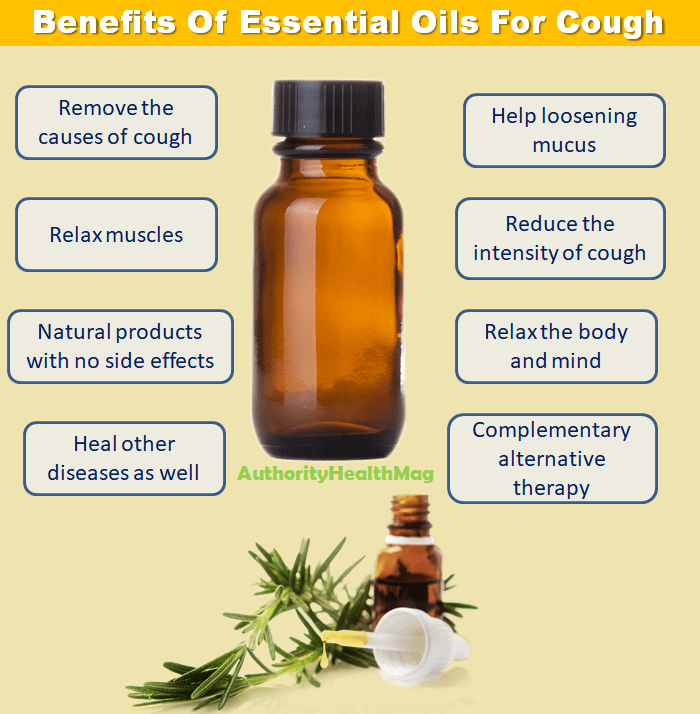Coughing is a common respiratory condition most people suffer from at least once a year.
Coughs commonly occur with flu, colds, asthma, emphysema, and chronic bronchitis.
According to a report published by the American Lung Association, “A cough can be the only sign of an illness, or it can occur with symptoms of certain diseases of the lung, heart, stomach and nervous system.”
All of us are familiar with natural remedies that are genuinely effective for managing this condition. Trying essential oils for coughs as a home remedy is an excellent idea.
Benefits Of Essential Oils For Colds And Coughs
In a study published in the Journal of the Canadian Medical Association, over-the-counter (OTC) cough suppressants were found to have minimal effects and be harmful to children.
Similarly, using codeine to relieve this condition is dangerous for health. Codeine creates a narcotic-like effect in the body that causes withdrawal symptoms like other opiates. According to research, antihistamines and codeine pills have a minor effect on cough relief.
An article published by NARCONON warns against using OTC cough suppressants like syrups and dextromethorphan pills. When taken in large doses, it produces hallucinations, drunkenness, and a sense of separation from one’s body and identity.
Treating the cough with natural remedies is more effective than consuming OTC suppressants or prescription medicines.
Some of the best-known home remedies for coughs are:
- Homemade honey
- Essential oils
- A hot shower
- Black pepper and honey tea
- A lot of warm liquids
- Menthol cough drops
- Undiluted lemon juice
- Licorice tea
- Ginger tea
- Thyme tea
Using essential oils for treating a cough is a compelling idea. Several essential oils for cough have antibacterial, antiviral, antispasmodic, and expectorant properties.
Many essential oils are safe and effective for relieving many respiratory conditions like common colds, sinusitis, coughs, sore throats, and congestion. In contrast to OTC and prescription cough medicines, they have no side effects.
Lavender and tea tree oils are the most popular EOs.
The benefits of using essential oils may include:
- Remove the cause of the cough and scratchy throat
- Helps to loosen mucus
- Relaxes muscles
- Reduces the severity of coughing
- EOs are natural products with no side effects.
- Relaxes the body and mind
- Heals other diseases as well
- EOs are a complementary alternative therapy

12 Best Essential Oils For Cough
As a result of their powerful medicinal properties, essential oils for cough and congestion work well.
Some EOs effectively eliminate bacteria, viruses, or allergens that cause colds, coughs, and congestion.
They relieve your cough by loosening the mucus and relieving the muscles in the respiratory system.
EOs aid in an increased oxygen supply to your lungs by clearing infection and mucus in the respiratory tract.
Here is a list of the twelve effective essential oils we have handpicked out of the numerous essential oils available. Use these oils to relieve a cough or cold.
1. Eucalyptus Essential Oil
There is no doubt that eucalyptus oil is an effective cough remedy. This oil has excellent expectorant properties that help clear the toxins and microorganisms that cause colds and coughs.
Eucalyptus oil has cineole, also known as eucalyptol, a potent antimicrobial agent that can eliminate the cause of coughing.
This oil is effective for patients who struggle to get a breath while coughing. It dilates your blood vessels and increases the oxygen supply to the lungs.
According to a research report published in the journal Evidence-Based Complementary and Alternative Medicine, eucalyptus oil significantly and immediately improves the symptoms of upper respiratory ailments.
You can use it for coughing in different ways, such as diffusing it, applying it topically, using homemade vapor rubs, or directly inhaling it.
2. Rosemary Essential Oil
Rosemary oil is a fantastic natural remedy for coughs. The cineole substance present in the eucalyptus is also found in it.
This oil is especially beneficial for people suffering from rhinosinusitis and asthma, as it reduces the frequency of coughing.
Rosemary oil’s antimicrobial and antioxidant properties fight the cause of coughs and boost your immune system.
Rosemary oil is also effective for calming the stressed muscles in your trachea.
Diffusing this oil for inhalation or rubbing diluted rosemary on the chest and throat relieves coughs.
3. Cinnamon Essential oil
According to a study, cinnamon oil helps reduce respiratory tract pathogens if emitted in a gaseous state for a short timeframe. Tea tree essential oil is a good substitute for it.
This oil suppresses the rapid reproduction of bacteria that cause colds and coughs.
Diffusing or inbreathing cinnamon oil diluted in a steam bowl is the right way to use cinnamon oil for coughs.
4. Peppermint essential oil
According to a research report published in the International Society of Sports Nutrition (ISSN), peppermint oil relaxes the bronchial muscles. It increases ventilation to reduce cough severity and increase the ability to breathe.
Peppermint oil for coughs is a proven remedy because of its menthol compound. Menthol enhances smooth airflow through the nasal passage by removing nasal congestion.
This oil contains antibacterial and antiviral properties that help to eliminate the causes of throat infection and cough.
Peppermint oil can be directly inhaled or diffused to relieve coughing quickly. You may also topically apply diluted peppermint oil to the chest and throat to calm coughing.
5. Nutmeg Essential Oil
According to a study report, breathing nutmeg oil reduces respiratory tract fluid in rabbits.
Nutmeg oil is also commonly used in natural remedies for coughs.
This oil also contains expectorant properties that are effective for loosening mucus and relieving blockages.
Diffusing nutmeg oil with the help of a diffuser can help relieve your severe coughing problem.
6. Geranium Essential Oil
As per a study published in 2007, administering a few drops of geranium oil reduces the symptoms of coughs.
Geranium oil is a popularly used remedy for dealing with bronchitis and upper respiratory tract infections.
Research published by Complementary Medicine Research indicated geranium extracts’ possible effectiveness in relieving dry cough and cold symptoms.
To relieve cough and upper respiratory infection, inbreathe the geranium oil by diffusing it or use it in your warm water bath.
7. Oregano Essential oil
Oregano oil has carvacrol and thymol, both potential antifungal and antibacterial compounds.
Research on oregano extracts points out the possibility of using oregano oil as a natural alternative to antibiotics for treating bronchial conditions.
Because of its potent antiviral properties, Oregano oil is worth using for treating coughs resulting from viral infections.
I use oregano oil to calm a cough by diffusing it or applying it topically.
This oil is also suitable for ingesting; add two drops to a glass of warm water and drink twice daily to relieve a bacterial infection that leads to coughing. However, ingesting this oil may interact with other medications you are taking.
8. Bergamot Essential Oil
Bergamot oil possesses the molecule camphene. According to recent research, inhaling camphene may help relieve breathing tract fluid.
This oil is a popular ingredient in natural oil blends or therapies for relieving throat congestion.
You can get fast relief from a cough by using bergamot oil in a diffuser or humidifier.
9. Cyprus Essential Oil
Cyprus oil is rich in camphene, like bergamot and nutmeg.
Inhaling Cyprus oil can help relieve cough and congestion because of the camphene molecules present in it.
You can have steam inhalation of Cyprus oil by adding a few drops of this oil to a bowl of lukewarm water and inhaling the water vapor.
10. Thyme Essential Oil
According to a research article published by Phytotherapy Research, the antimicrobial properties contained in thyme oil help certain respiratory conditions like colds, coughs, and congestion.
Researchers have found this oil to be effective as a natural remedy for combating respiratory tract pathogens.
To relieve colds and coughs, diffuse this oil rapidly at a high concentration for a short time.
11. Lemon Essential Oil
Its antibacterial and antioxidant properties make lemon essential oil an effective cough remedy.
This oil encourages lymphatic drainage, which helps relieve coughs and colds quickly. It can also boost your immunity to ward off infections responsible for coughs.
Inhaling lemon oil by diffusing it or topically applying it to your chest and neck can aid in draining your lymphatic system.
12. Lavender Essential Oil
Lavender oil helps relieve coughs resulting from asthma.
One of the studies published by The Life Sciences indicated that inhaling lavender oil can help clear airway resistance caused by bronchial asthma.
Aromatherapy with lavender oil reduces the stress and irritation caused by a severe cough and relaxes the body and mind.
When used in steam inhalation, a diffuser, or lukewarm water baths, lavender oil can treat coughs.
Best Ways To Use EOs
It is easy to use essential oils for cold and cough relief.
Essential oils contain potent compounds; thus, dilution is necessary before use. You can quickly dilute essential oils using any carrier oil in your kitchen cabinet. Some of the best carrier oils are coconut oil, olive oil, and sweet almond oil.
Here are the ways to make use of essential oils to get rid of coughs:
- Gently massage the diluted essential oil or oil blend on your chest and around the neck.
- Add a few drops of essential oil to a bowl of hot water and inhale the vapor for a few minutes.
- Mix the essential oils in hot water used for bathing or with other spa products.
- For a few minutes, inhale the oil’s aroma from the bottle or an oil-soaked cotton ball.
- Ingest a few drops of oil diluted in hot water (only those oils are fit for internal consumption).
Side Effects And Warnings
As essential oils have highly potent compounds in concentrated form, they should be used cautiously.
The U.S. Food and Drug Administration does not monitor, certify, or verify the quality or effectiveness of essential oils. Buying essential oils from reliable manufacturers and sellers with an established market reputation is wise.
Any competent authority in the field does not specify the dosage and use of essential oils. Do not use more than a few drops of essential oils at a time for safety reasons.
Always discuss essential oils with your doctor to avoid possible interactions with medications for other health conditions.
The use of essential oils is not recommended for infants, pregnant women, breastfeeding mothers, and patients on long-term medication.
The only complementary alternative remedy for coughing is essential oils. You must see your doctor if the cough condition does not improve within 24 hours of using essential oils.
Do a skin patch test of EOs before use, as some of the oils may cause allergic reactions in some people.
Use only 100 percent pure EOs to treat cough for the most effective results.
The Final Thought
A severe cough is a nuisance that can disturb your work, sleep, and ability to breathe comfortably.
Many people use over-the-counter (OTC) products to relieve a cough. However, most of those products could be more effective for children and adults. OTC products can also produce serious side effects if used for an extended period.
It is easy and beneficial to use essential oils to relieve coughs instead of OTC products. Essential oils need more definitive research on their usefulness in treating coughs, but traditional home remedies vouch for their effectiveness.
Use essential oils cautiously, as they contain potent compounds that can cause allergic reactions. Introduce only one oil at a time and dilute it with a carrier oil before use.
Do not delay medical treatment if you have a severe cough with other associated symptoms.
With few side effects, essential oils for cough are a safe, convenient, and effective home remedy.
Recommended reading list:
